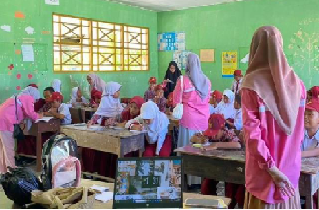Socialization of “Fill My Plate” to Elementary School Children in Liukang Loe Island, Bulukumba Regency
Abstract
Eating habits in school children are formed from an early age and form the basis of children's nutritional intake patterns at a later age. The aim of this service is to increase school children's knowledge about balanced nutrition and children's skills in choosing balanced nutritious food through the socialization of “fill my plate” (in Indonesia: “isi piringku”). The target participants of this service activity are 50 elementary school children on Liukang Loe Island, Bulukumba Regency. The knowledge of the target group was assessed through pre and post-tests distributed before and after socialization. Pre-test and post test data were then analyzed using the Wilcoxon test. The results of data analysis showed that in the initial condition, the target group with sufficient knowledge of 44% increased to 68% in the condition after socialization. The Wilcoxon test results showed that there was a significant difference in knowledge level between before and after the target group received the "fill of my plate" socialization (p=0.004 <0.05). The target group of elementary school children was very enthusiastic in participating in the socialization and became a good alternative in increasing students' knowledge related to portion intake and food variations.
References
Alcantara, M. A., & Marisa A. Frontreras. (2024). The Impact of Nutritional School Based Feeding Program on Academic Achievement of Selected Elementary Learners in West Philippines. International Journal of Education and Teaching Zone, 3(1), 73–81. https://doi.org/10.57092/ijetz.v3i1.153
Bandura, A. (2019). The social learning theory of aggression. In The War System (pp. 141-156). Routledge.
Berhe, K., Seid, O., Gebremariam, Y., Berhe, A., & Etsay, N. (2019). Risk factors of stunting (chronic undernutrition) of children aged 6 to 24 months in Mekelle City, Tigray Region, North Ethiopia: An unmatched case-control study. Plos one, 14(6), e0217736.
Black, R. E., Victora, C. G., Walker, S. P., Bhutta, Z. A., Christian, P., de Onis, M., ... & Uauy, R. (2013). Maternal and child undernutrition and overweight in low-income and middle-income countries. The Lancet, 382(9890), 427-451.
Briliannita, A. (2022). Peningkatan Pengetahuan Masyarakat Tentang Peran Gizi Seimbang Dengan Komposisi “fill my plate” Pada Masa Pandemi Covid-19. Jurnal Panrita Abdi, 6(2), 420–427. http://journal.unhas.ac.id/index.php/panritaabdi
Cohen, J. F., Hecht, A. A., McLoughlin, G. M., Turner, L., & Schwartz, M. B. (2021). Universal school meals and associations with student participation, attendance, academic performance, diet quality, food security, and body mass index: a systematic review. Nutrients, 13(3), 911.
Green, E. C., Murphy, E. M., & Gryboski, K. (2020). The health belief model. The Wiley encyclopedia of health psychology, 211-214.
Januari, N., Mohamad, S. N., Akolo, I. R., Napu, D. D., Sultan, I., & Gorontalo, A. (2024). Edukasi dan Sosialisasi “fill my plate” pada Siswa Madrasah Ibtidaiyah Al- Falah Kabupaten Gorontalo. Pusat Publikasi Hasil Pengabdian Masyarakat, 2(1).
Kennedy, A., Wright, B. K., & Missingham, R. (2019, October 21–25). Contoh Penulisan Konferensi [Paper presentation]. eResearch Australasia Conference, Australia.
Khan, S., Zaheer, S., & Safdar, N. F. (2019). Determinants of stunting, underweight and wasting among children< 5 years of age: evidence from 2012-2013 Pakistan demographic and health survey. BMC public health, 19, 1-15.
Kliziene, I., Cizauskas, G., Sipaviciene, S., Aleksandraviciene, R., & Zaicenkoviene, K. (2021). Effects of a physical education program on physical activity and emotional well-being among primary school children. International journal of environmental research and public health, 18(14), 7536.
Li, Z., Kim, R., Vollmer, S., & Subramanian, S. V. (2020). Factors associated with child stunting, wasting, and underweight in 35 low-and middle-income countries. JAMA network open, 3(4), e203386-e203386.
Nita, V., & Mayangsari, A. (2023). Edukasi “fill my plate” pada Anak usia dini dengan media permainan food model terhadap perilaku pemilihan makanan. Jikes: Jurnal Ilmu Kesehatan, 2(1), 60–65. http://qjurnal.my.id/index.php/jik/article/view/741
Norris, S. A., Frongillo, E. A., Black, M. M., Dong, Y., Fall, C., Lampl, M., & Patton, G. C. (2022). Nutrition in adolescent growth and development. The lancet, 399(10320), 172-184.
Nugrahaeni S. A,., Aruben, R., Prihatin, I. J., Sari, S., & Sulistyowati, E. (2018). Peningkatan Praktik Mandiri Ibu dalam Pemantauan Status Gizi Balita melalui Pendampingan Aktivitis Dasa Wisma. Media Kesehatan Masyarakat Indonesia, 14(4), 418. https://doi.org/10.30597/mkmi.v14i4.5233
Roberts, M., Tolar-Peterson, T., Reynolds, A., Wall, C., Reeder, N., & Rico Mendez, G. (2022). The effects of nutritional interventions on the cognitive development of preschool-age children: a systematic review. Nutrients, 14(3), 532.
UNICEF. (2013). Improving Child Nutrition: The achievable imperative for global progress. New York: UNICEF.
Yuniarti, H., Susanto, E., & Kemenkes Palembang, P. (2021). Improvement of Balanced Nutritional Knowledge and Skills Through the Demonstration of “fill my plate” in Basic School Children. JCES (Journal of Character Education Society), 4(2), 495–503.

Copyright (c) 2024 Syarfaini Syarfaini, Rini Jusriani Rini, Fatmawaty Mallapiang, Azriful Azriful, Fitrah Fitrah

This work is licensed under a Creative Commons Attribution-NonCommercial-ShareAlike 4.0 International License.
